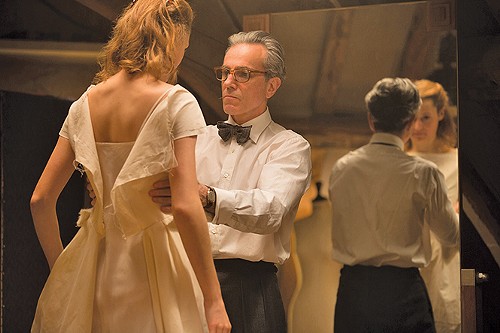Abdication of Power
Phantom Thread makes a great actor's farewell a tale of relationship control.
By Scott Renshaw @scottrenshawIt was probably inevitable that the news of Daniel Day-Lewis' retirement from acting—making Phantom Thread possibly his last screen performance—would dominate the pre-release conversation about the movie. The three-time Oscar-winner's reunion with writer/director Paul Thomas Anderson, who oversaw Day-Lewis' towering work in There Will Be Blood, might add even more baggage to the assumptions a viewer could have coming in. The commanding presence of Day-Lewis would surely be part of another tale of a powerful man who manipulates everyone around him to get what he wants.
At the outset of Phantom Thread, that preconception seems to be justified. Day-Lewis plays Reynolds Woodcock, a successful fashion designer in 1950s London who does the creative work while leaving the business side to his sister, Cyril (Lesley Manville). A fastidious serial monogamist, Reynolds has just moved on from his last live-in muse when he meets Alma (Vicky Krieps), a diner waitress. The two soon become lovers, whereupon Alma discovers just how particular Reynolds is about the way he wants his world organized.
Thus begins what superficially appears to be the latest in film history's long tradition of Portraits of the Artist as a Complete Asshole. Krieps plays Alma with an initial passivity and uncertainty about how to please the seemingly impossible-to-please Reynolds, and Anderson employs a wonderful sound design to emphasize every scrape of a breakfast plate that irritates Reynolds' desire for a silent start to his day. He exercises his power over her by having her strip to her slip at the very beginning of their relationship, adding to the sense that she's simply a paper doll there to help inspire Reynolds in his work.
Day-Lewis, for his part, does exactly what is demanded of the role in these early scenes, capturing Reynolds' obvious sophistication and charm along with the dismissive way he treats every woman in his life except Cyril (played by Manville with a steely sense of her own importance to her brother). Like all of the greatest actors, he does more with a gesture—or with a frustrated exhale—than other actors can do with a monologue, building the sense of Reynolds as a petty tyrant who happens also to be talented. If this is indeed Day-Lewis' farewell performance, it's another masterwork.
And it seems perhaps even more masterful once the true nature of his relationship with Alma fully unfolds. Anderson drops plenty of hints regarding what Reynolds is really looking for in a wife and a partner, to the point that, in hindsight, Phantom Thread might seem to reduce the character to one big "issue" in need of resolution. But the interaction between Reynolds and Alma keeps getting more and more complicated, until it becomes clear that the Reynolds Woodcock we see at the beginning of the movie isn't really the Reynolds Woodcock he wants to be.
What Anderson constructs, then, isn't simply a showpiece for the greatest actor of his generation to stand astride a mountain and let us gaze upon his majesty. Phantom Thread is about power within a relationship, and as such it absolutely demands a performance that can stand up to Day-Lewis. Krieps does phenomenal work with her eyes and body language, as Alma gradually begins to assert herself and finally understand what it is she might be able to give Reynolds that nobody else has. It's a tale of people not simply battling for the upper hand, but coming to understand when and why they might not want the upper hand.
Anderson certainly gives everything he has as a filmmaker to Phantom Thread, including gathering collaborators like composer Jonny Greenwood and costume designer Mark Bridges to fill out this world with lush sonic and visual textures. But the greatest gift he offers here is understanding that he has written a story where the focus needs to be on these two central performances—always equal partners in the story, even when dynamic between the characters is far from equal. Phantom Thread doesn't send Daniel Day-Lewis out by giving him A Daniel Day-Lewis Movie. It offers us a chance to see how much talent it requires to play a moment when someone's voluntary bite of food turns into a surrender.
More by Scott Renshaw
-
Feature film review: THE BEAST
A filmmaker's compelling ideas get a bit tangled in references to his creative influences.
- Apr 17, 2024
-
Faces of Salt Lake County book and portrait reception
Images and personal stories in a new book reveal local demographic diversity
- Apr 17, 2024
-
Film Reviews: New Releases for April 12
Civil War, Escape from Germany, Coup de Chance, Hundreds of Beavers, La Chimera, Sting
- Apr 11, 2024
- More »
Latest in Film Reviews
Readers also liked…
-
Power Plays
Two satirical comedies explore manipulations and self-delusions by those with power.
- Aug 31, 2022




